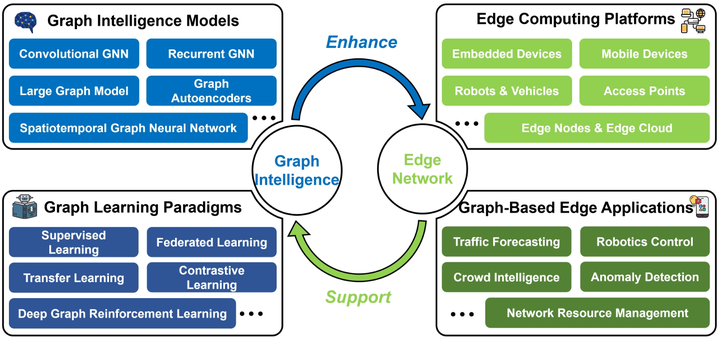Edge Graph Intelligence: Reciprocally Empowering Edge Networks with Graph Intelligence
 EGI Overview
EGI Overview
Abstract
Recent years have witnessed a thriving growth of computing facilities connected at the network edge, cultivating edge computing networks as a fundamental infrastructure for supporting miscellaneous intelligent services like personal voice assistance, video security surveillance, and autonomous driving vehicles. Meanwhile, Artificial Intelligence (AI) frontiers have extrapolated Machine Learning (ML) to the graph domain and promoted Graph Intelligence (GI), which unlocks unprecedented ability in processing, abstracting, and learning from massive data in graph structures. Given the inherent relation between graphs and networks, the interdiscipline of graph representation learning and edge networks, i.e., Edge GI or EGI, has revealed a novel interplay between them – GI models principally open a new door for modeling, understanding, and optimizing edge networks, and conversely, edge networks serve as physical support for training, deploying, and accelerating GI models. Driven by this delicate closed-loop, EGI can be widely recognized as a promising solution to fully unleash the potential of edge computing power and is garnering significant attention. Nevertheless, research on EGI yet remains nascent, and there is a soaring demand within both the communications and AI communities for a dedicated venue to share recent advancements. To this end, this paper promotes the concept of EGI, explores its scope and core principles, and conducts a comprehensive survey concerning recent research efforts on this emerging field and specifically, introduces and discusses: 1) fundamentals of edge computing and graph representation learning, 2) emerging techniques centering on the closed loop between graph intelligence and edge networks, i.e., “edge for GI” and “GI for edge”, and 3) open challenges and research opportunities of future EGI. By bridging the gap across communication, networking, and graph learning areas, we believe that this survey can garner increased attention, foster meaningful discussions, and inspire further research ideas in EGI.